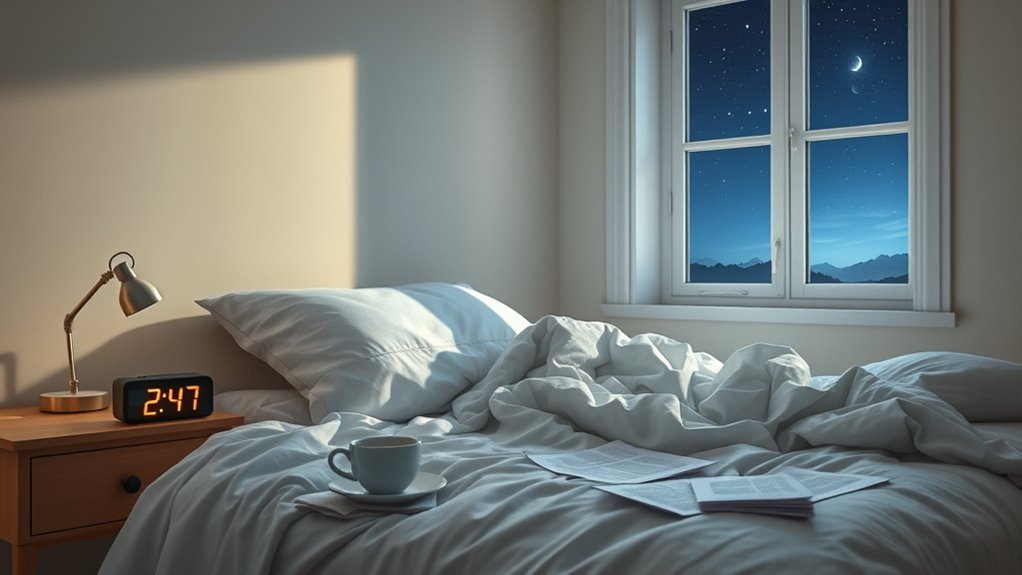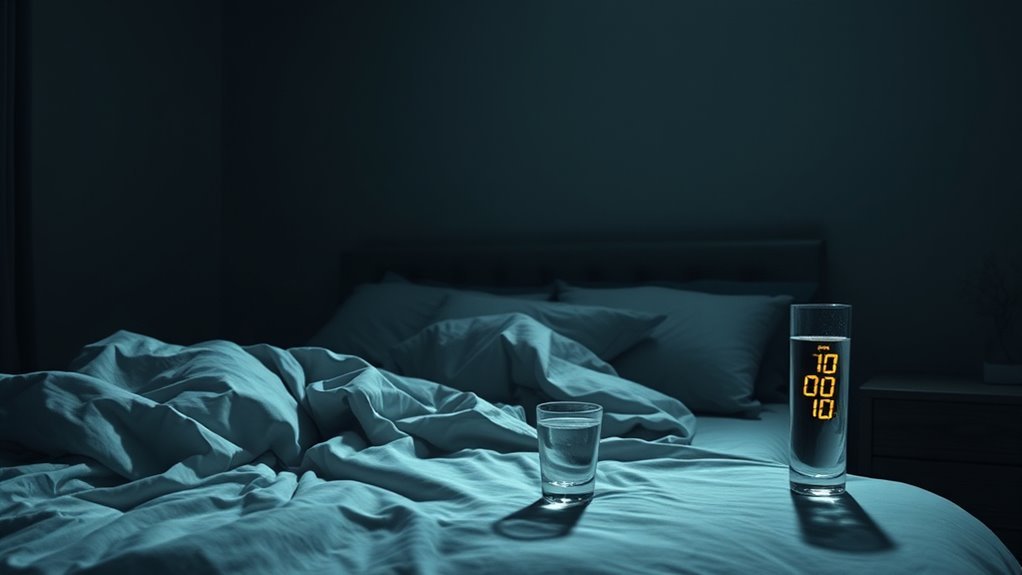Keto insomnia can last anywhere from a few days to several weeks as your body adjusts to burning fat for fuel instead of carbohydrates. During the first few days, you might experience sleep disruptions, but it often improves by weeks two or three. Factors like hormonal changes and electrolyte imbalances can prolong these disturbances, but staying hydrated and maintaining nutrient intake can help. Curious about more strategies to ease your shift? Let’s explore further!
Understanding Keto Insomnia

While you might think a ketogenic diet is all about burning fat and boosting energy, it can also lead to some unexpected side effects, including insomnia. As your body undergoes keto adaptation, it shifts from burning carbohydrates to utilizing fat for fuel. This shift can disrupt your sleep cycles, making it hard to fall or stay asleep. You may find yourself tossing and turning or waking up frequently during the night. The change in energy source can also impact your hormone levels, particularly those related to sleep regulation. Understanding these effects can empower you to take steps toward better rest, ensuring your keto journey supports your overall well-being. Remember, quality sleep is essential for maintaining your energy and health on this diet.
Common Causes of Sleep Disturbances on Keto

As you commence your ketogenic journey, it’s essential to recognize that certain factors can contribute to sleep disturbances. One common issue is keto cravings, which can keep your mind racing at night, making it tough to fall asleep. When your body shifts to burning fat for fuel, it may crave carbohydrates, leading to those restless nights. Another significant cause is electrolyte imbalance. The ketogenic diet can result in the loss of electrolytes like sodium, potassium, and magnesium, which are vital for proper nerve function and relaxation. This imbalance can manifest as muscle cramps, headaches, or even insomnia. By addressing these issues through proper hydration and balanced nutrient intake, you can pave the way for more restful nights on your keto journey.
Duration of Keto Insomnia: What to Expect

When you shift to a keto diet, you might notice changes in your sleep patterns, and understanding the duration of keto insomnia can help you manage these disruptions. Common symptoms include difficulty falling asleep and frequent awakenings, but knowing what to expect with regard to recovery timeline can ease your concerns. Additionally, implementing effective tips for better sleep can greatly improve your rest during this adjustment period.
Common Symptoms Experienced
Although many people turn to the ketogenic diet for its weight loss benefits, some may find themselves grappling with insomnia as a side effect. You might notice significant changes in your sleep patterns, including difficulty falling asleep, frequent awakenings, or waking up too early. These disruptions can be compounded by keto cravings, as your body adjusts to lower carbohydrate intake and shifts its energy sources. You may feel restless or experience heightened anxiety, making it tough to relax at night. Additionally, some individuals report vivid dreams or night sweats. Recognizing these common symptoms can help you understand that you’re not alone in this journey, and addressing them may lead you to better sleep and overall success on your keto path.
Typical Recovery Timeline
Sleep disturbances during the ketogenic diet can be frustrating, but understanding the typical recovery timeline can offer some reassurance. Generally, you might experience keto insomnia for a few days to a couple of weeks as your body adapts to new sleep cycles and manages keto cravings.
Here’s what you can expect during your recovery:
- Days 1-3: Initial sleep disruptions as your body shifts from carbs to fat for energy.
- Week 1: Sleep might still be restless, but fatigue from keto adaptation may improve.
- Weeks 2-3: Many people notice better sleep quality and more stable sleep cycles.
- Month 1: By now, your body should be well-adjusted, leading to enhanced sleep and reduced cravings.
Stay patient; your body is adjusting!
Tips for Better Sleep
To improve your sleep while managing the challenges of keto insomnia, it’s essential to adopt several effective strategies. Start by incorporating relaxation techniques like deep breathing, meditation, or gentle yoga before bedtime. These practices can calm your mind and prepare your body for sleep. Additionally, consider sleep supplements such as magnesium or melatonin, which may help regulate your sleep cycle.
Make your sleep environment comfortable—keep your room dark, cool, and quiet. Limit screen time an hour before bed to reduce blue light exposure, which can disrupt your circadian rhythm. Finally, establish a consistent bedtime routine to signal to your body that it’s time to wind down. With these tips, you can reclaim restful nights and enjoy the freedom that comes with quality sleep.
Factors Influencing the Length of Sleep Disruptions
While many people find the ketogenic diet beneficial for weight loss and energy levels, it can also lead to sleep disruptions that vary in duration. Several factors influence how long these sleep disturbances last:
The ketogenic diet can enhance weight loss and energy, but it may also cause varying sleep disruptions.
- Hormonal fluctuations: Changes in your body’s hormones can impact your sleep cycles.
- Caffeine intake: Consuming caffeine, especially later in the day, may worsen insomnia.
- Dietary changes: Adjusting your macronutrient ratios can disrupt your body’s natural rhythms.
- Stress management: High-stress levels can lead to prolonged sleep issues.
Tips for Improving Sleep Quality on Keto
Improving your sleep quality on a keto diet can be achieved through simple adjustments to your routine and nutrition. By implementing effective sleep hygiene practices and making mindful dietary choices, you can enhance your rest. Let’s explore some practical tips that can help you sleep better while staying on track with your keto lifestyle.
Sleep Hygiene Practices
Since adopting a keto diet can sometimes disrupt your sleep patterns, implementing effective sleep hygiene practices becomes essential for maintaining quality rest. Focus on creating a conducive sleep environment and incorporating relaxation techniques into your routine. Here are some tips to help you get better sleep:
- Set a consistent sleep schedule, going to bed and waking up at the same time daily.
- Limit exposure to screens an hour before bed to reduce blue light interference.
- Create a calming bedtime routine, such as reading or meditating, to signal your body it’s time to wind down.
- Keep your bedroom cool, dark, and quiet to enhance comfort and minimize disturbances.
Nutritional Adjustments for Sleep
To enhance your sleep quality on a keto diet, contemplate making specific nutritional adjustments that can positively impact your rest. Focus on nutrient timing by consuming your last meal a few hours before bed, allowing your body to digest properly. Incorporating magnesium-rich foods like spinach, nuts, and avocados can also be beneficial, as magnesium helps regulate sleep cycles and promote relaxation. You might want to contemplate a magnesium supplement if you struggle to meet your daily intake. Additionally, avoid caffeine and sugar in the evening to reduce sleep disruptions. By fine-tuning your diet with these strategies, you can reclaim restful nights and enjoy the freedom of a balanced keto lifestyle.
When to Seek Professional Help
If you’ve been struggling with insomnia while following a keto diet, it might be time to reflect on seeking professional help. Persistent sleep issues can affect your mental health and overall well-being. Here are a few signs to take into account:
- You’re experiencing insomnia for more than a few weeks.
- Your daytime functioning is impaired due to lack of sleep.
- You’ve tried various self-help strategies without success.
- You notice increased anxiety or mood changes.
Consulting with sleep specialists can provide tailored solutions that address your unique situation. They can help you explore underlying issues and develop a personalized plan to improve your sleep. Remember, prioritizing your mental health is essential for achieving long-term success on your keto journey.
Personal Experiences and Adaptation Stories
While many people find success with the keto diet, their journeys often include a period of adjustment that can bring about challenges like insomnia. You might hear various keto diet experiences where others faced sleepless nights, attributing it to carb withdrawal or electrolyte imbalances. Some share insomnia stories of tossing and turning, feeling restless as their bodies adapted to burning fat for fuel. But it’s important to remember that these struggles often subside as your body adjusts. Staying hydrated, ensuring adequate magnesium intake, and maintaining a consistent sleep schedule can help ease this change. Your personal experience might mirror others’, but with patience and self-care, you can reclaim restful nights on your keto journey.
Frequently Asked Questions
Can Supplements Help Alleviate Keto Insomnia Symptoms?
About 30% of people on a keto diet report sleep disturbances. Supplements can indeed help alleviate keto insomnia symptoms. Melatonin, magnesium, and L-theanine are known for their sleep-enhancing properties, and their efficacy may improve your keto sleep quality. Research suggests that these supplements can support relaxation and regulate sleep cycles, making your shift to ketosis smoother. Just remember to consult with a healthcare professional before starting any new supplement regimen!
Is Keto Insomnia More Common in Beginners?
Yes, keto insomnia is often more common in beginners. During the keto shift, your body undergoes significant changes, which can temporarily impact sleep quality. As your body adapts to burning fat for fuel instead of carbs, fluctuations in energy levels and hormonal adjustments may disrupt your sleep patterns. Staying hydrated, managing stress, and gradually easing into keto can help ease this shift, allowing you to reclaim those peaceful nights of rest you deserve.
Can Sleep Disturbances Affect Weight Loss on Keto?
Yes, sleep disturbances can negatively impact weight loss on keto. Poor sleep quality can lead to increased hunger hormones and cravings, making it harder to stick to your low-carb diet. When you’re well-rested, your body regulates hormones better, helping you maintain a caloric deficit. So, prioritizing sleep is essential for achieving your weight loss goals. Consider incorporating relaxation techniques to improve your sleep and enhance your overall keto experience.
Are Certain Keto Foods Better for Sleep Quality?
Yes, certain keto foods can enhance your sleep quality. Incorporating keto snacks rich in magnesium, like nuts and seeds, can help regulate sleep hormones. Foods with healthy fats, such as avocados and fatty fish, can also support restful sleep. Avoiding caffeine and high-sugar snacks before bedtime can prevent disturbances. By choosing the right keto options, you can enjoy better sleep while still enjoying the freedom of a low-carb lifestyle.
How Does Hydration Impact Sleep on a Keto Diet?
Imagine your body as a well-tuned engine; without proper hydration, it can sputter and stall. On a keto diet, staying hydrated is essential for sleep hygiene. Dehydration can lead to restless nights and fatigue, undermining your progress. To enhance your sleep, drink enough water throughout the day and consider hydration tips like adding electrolytes. This way, you’ll wake up refreshed and ready to embrace your newfound freedom in life!
Frequently Asked Questions About Keto Insomnia
1. How long does keto insomnia typically last?
Keto insomnia can last anywhere from a few days to several weeks, depending on the individual. Many people experience sleep disturbances during the initial phase of the ketogenic diet as their body adjusts to a new energy source. While some may find their sleep improves within a week, others might take longer, particularly if they are experiencing withdrawal from sugar or carbohydrates.
2. What causes insomnia when starting a keto diet?
Keto insomnia can be attributed to several factors. The reduction in carbohydrate intake can lead to fluctuations in blood sugar levels, which may disrupt sleep. Additionally, the transition to burning fat for fuel can cause temporary hormonal imbalances. Moreover, dehydration and electrolyte imbalances, common when starting keto, can affect sleep quality. Lastly, anxiety or stress related to dietary changes can also contribute to insomnia.
3. Are there ways to alleviate keto insomnia?
Yes, there are several strategies to alleviate keto insomnia. Staying hydrated and ensuring adequate electrolyte intake, especially magnesium and potassium, can help. Establishing a regular sleep routine, creating a comfortable sleep environment, and practicing relaxation techniques such as meditation or deep breathing can also benefit sleep. Additionally, avoiding stimulants like caffeine later in the day may improve sleep quality. If insomnia persists, consulting a healthcare professional is advisable.
4. Can long-term keto use lead to ongoing sleep issues?
For most individuals, long-term adherence to a ketogenic diet does not lead to ongoing sleep issues. Once the body adapts to ketosis, many report improved sleep quality. However, if someone continues to experience sleep disturbances, it may be due to other lifestyle factors or medical issues unrelated to the diet. It’s important to monitor your overall health and discuss persistent sleep problems with a healthcare provider.
5. Is keto insomnia a common experience?
Yes, keto insomnia is a common experience among those starting the ketogenic diet. Many individuals report sleep disturbances during the initial transition period as their bodies adapt to using fat for fuel instead of carbohydrates. While it’s a widespread phenomenon, experiences vary; not everyone will encounter insomnia, and many may find that their sleep improves as they adjust to the diet.
References
- https://www.ncbi.nlm.nih.gov/pmc/articles/PMC6342628/
- https://www.healthline.com/nutrition/keto-diet-and-sleep
- https://www.webmd.com/diet/what-is-the-ketogenic-diet
- https://www.sleepfoundation.org/nutrition/keto-diet-sleep
- https://www.ncbi.nlm.nih.gov/pmc/articles/PMC7841939/
- https://www.theguardian.com/lifeandstyle/2020/dec/04/how-keto-diet-can-impact-your-sleep
- https://www.sciencedirect.com/science/article/pii/S2212267221000483


